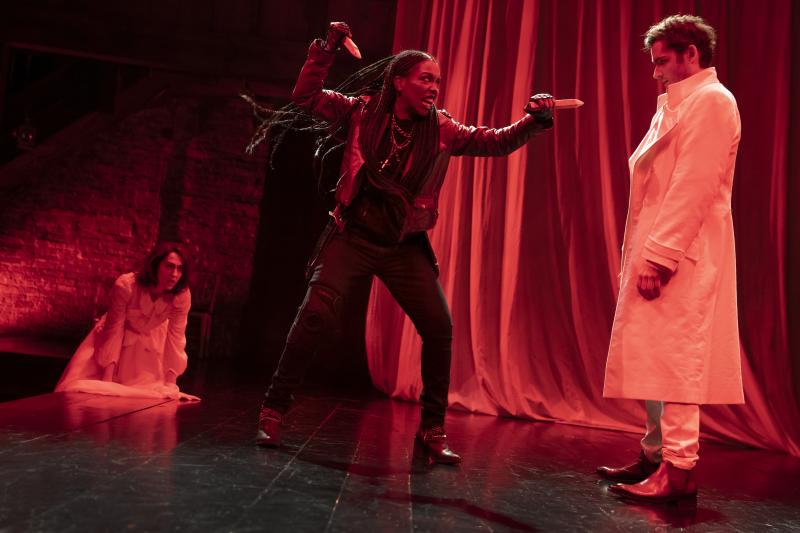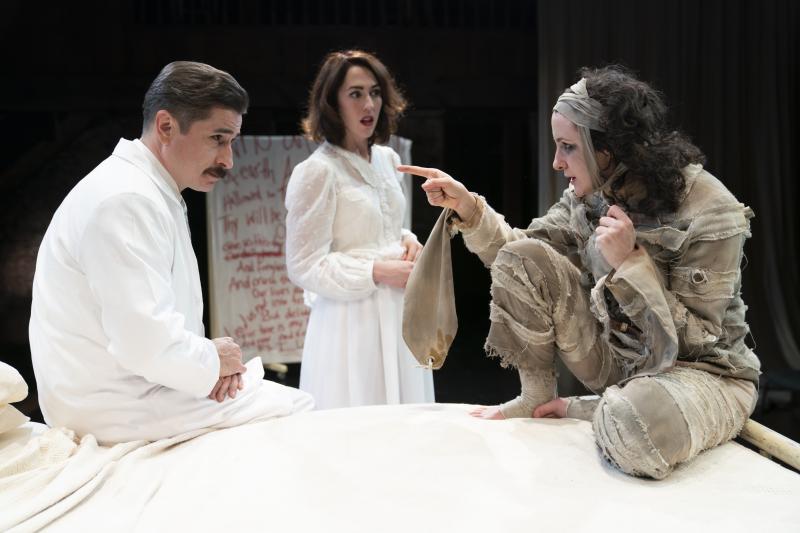Review: Kate Hamill's Clever Take On DRACULA Bites Back At Toxic Masculinity
"A vampire of that age is incredibly strong - he can bend minds; shape dreams; control those in weakened states. He is, truly, a monster in his prime."
In most adaptations of Bram Stoker's classic gothic novel, those words spoken by Dr. Van Helsing might be used to describe any generic brand of insidious evil, but in Kate Hamill's abundantly clever take on Dracula, granted a rip-roaring production by director Sarna Lapine at Classic Stage Company, they refer to the patriarchal attitudes and norms that have permeated humanity for centuries.

and Matthew Amendt (Photo: Joan Marcus)
In this version, Count Dracula (gregariously fun Matthew Armendt) is not an obvious outlier with fangs and pale skin, but a charming fellow you'd never suspect is spreading the acceptance of sexist attitudes and gender roles through his seductive bites.
So when nice guy solicitor Jonathan Harker (Michael Crane) regretfully leaves his pregnant wife Mina (Kelley Curran) on a business trip to handle the count's affairs, he finds himself enticed by his host's two predatory wives, Marilla (Lori Laing) and Drusilla (Laura Baranik). Lured in and exploited by their future husband during vulnerable times, they present themselves to their guest as wicked male fantasies and tease their prey with words like, "It's your own fault, darling... Coming in here dressed like that."
Harker's subsequent maddening behavior lands him in the asylum run by Dr. George Seward (hilariously stuffy Matthew Saldivar, getting laughs from straight lines) who is about to marry Mina's friend Lucy (Jamie Ann Romero), who confesses uncertainty about her fiancé.
"A man may be lovely during courtship, when they are trying to win you," she explains, "and then turn. It happens - all the time."
"Our whole destinies are wrapped up in the men we marry; once we are wed, we are - little better than their chattel, according to the law, and I just - wish I could be absolutely sure of his character."
With these relationships set up, the story shifts into high gear with the arrival of a woman named Dr. Van Helsing (a terrifically brash and engaging turn by Jessica Frances Dukes), a domestic abuse survivor turned vampire hunter, dressed in American western gear, sporting a kickass attitude and zero patience for mansplaining and other forms of casual sexism.
Though contemporary terms such as "toxic masculinity" are never used, audience members will get the point when she rolls her eyes at Seward for his inability to bring himself to addressing her as doctor and her warning to Mina that even though her husband seems to have settled back into his old self, those occasional fits of controlling anger, along with accusatory words, are not to be ignored.

(Photo: Joan Marcus)
The playwright herself appears as Renfield, described by Seward as "a lady-poet" who "wrote sonnets about flowers, and the countryside, and all that" until she disappeared while on a trip with her husband and was eventually found wandering the streets in her paranoid state. Her symptoms, as observed by Seward, include hysteria and a "pronounced sense of misandry."
The focus of the adventure becomes how Van Helsing influences Mina's realization that just because she's pregnant, it doesn't mean she can't be a fierce and heroic fighter and Curran does a great job bringing out the badass side of her prim character.
While the design elements by John Doyle (set), Robert Perdziola (costumes), Adam Honoré (lights) and Leon Rothenberg (sound) suggest traditional horror visuals, the true horror of the story is the existence of patriarchal manipulations so subtle that others will try and convince victims that they're overreacting to nothing. A final moment reminds women to always have a sharp stake handy, just in case.
Reader Reviews



